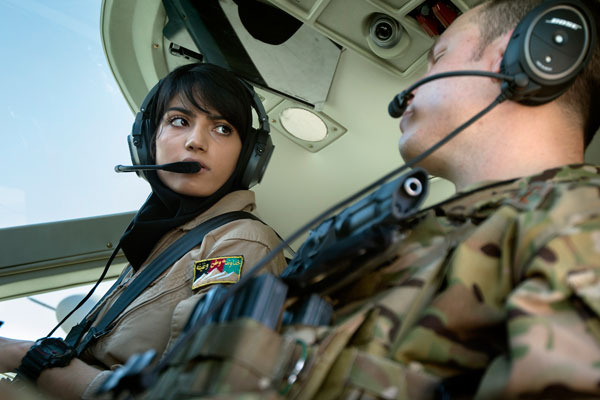Perhaps no Afghan’s story better embodied America’s aspirations for Afghanistan than that of Capt. Niloofar Rahmani, the first female fixed-wing pilot in the fledgling Afghan Air Force.
She was celebrated in Washington in 2015 when the State Department honored her with its annual Women of Courage award. “She continues to fly despite threats from the Taliban and even members of her own extended family,” the first lady, Michelle Obama, said in a statement.
On Thursday, on the eve of her scheduled return to Afghanistan from a 15-month training course at Air Force bases in Texas, Florida and Arkansas, Captain Rahmani broke a sobering piece of news to her American trainers. She still wants to be a military pilot, but not under her country’s flag. This summer, she filed a petition seeking asylum in the United States, where she hopes to eventually join the Air Force.
“Things are not changing” for the better in Afghanistan, Captain Rahmani said in an interview on Friday. “Things are getting worse and worse.”
Captain Rahmani was 10 years old when the United States toppled the Taliban government in Afghanistan in 2001. As the Bush administration set out to rebuild a country scarred by war, it made promoting women’s rights a priority, a bold undertaking in a deeply conservative nation where women had been barred from schools and the work force.
During her teenage years, Captain Rahmani was inspired by America’s goal of emancipating Afghan women. When she was 18, with the support of her parents, she eagerly enlisted in her country’s air force. “It has been always my dream to do this job, be a pilot,” she said. “It made me really proud.”
The American government hailed her example as a bright spot in the difficult effort to build the Afghan Air Force, which has cost American taxpayers more than $3.7 billion. The endeavor has been marred by delays, logistical challenges and wasteful spending.
After photos of Captain Rahmani wearing tan combat boots, a khaki flight suit, a black head scarf and aviator glasses were published in the press when she earned her wings in 2013, she and her relatives in Kabul began receiving death threats. At work in Afghanistan, she said, she felt unsafe because most of her male colleagues held her in contempt. Still, she put on a brave face during the early months of her training in the United States, which began in September 2015.
“I would just want to encourage all of the females around the world, especially in my country where the females have no rights, to just believe in themselves and to have more self-confidence,” Captain Rahmani told an American military journalist in March 2015 during a visit to a Marine Corps air station.
But that resolve has eroded in recent months. The Afghan Air Force stopped paying her salary shortly after the American training program began, Captain Rahmani said. When female workers at an airport in southern Afghanistan were slain this month, she was horrified to hear some members of Parliament quoted as saying the women would have been safe if they had stayed at home.
This new phase of her life in the United States starts with trepidation. “It makes me really nervous,” she said of having her asylum petition pending when President-elect Donald Trump has vowed to bar Muslims from entering the United States. Still, Captain Rahmani said she sees the United States as a place where women can aspire to accomplish great things.
She doesn’t believe that to be true of her homeland. Pursuing pathbreaking goals in today’s Afghanistan as a woman is futile, she said. “It’s better to keep it as a dream and not let it come true.”

